This is thorough manual for copper cookware fans to cook on induction stoves.
By Editor Team | February 20, 2022
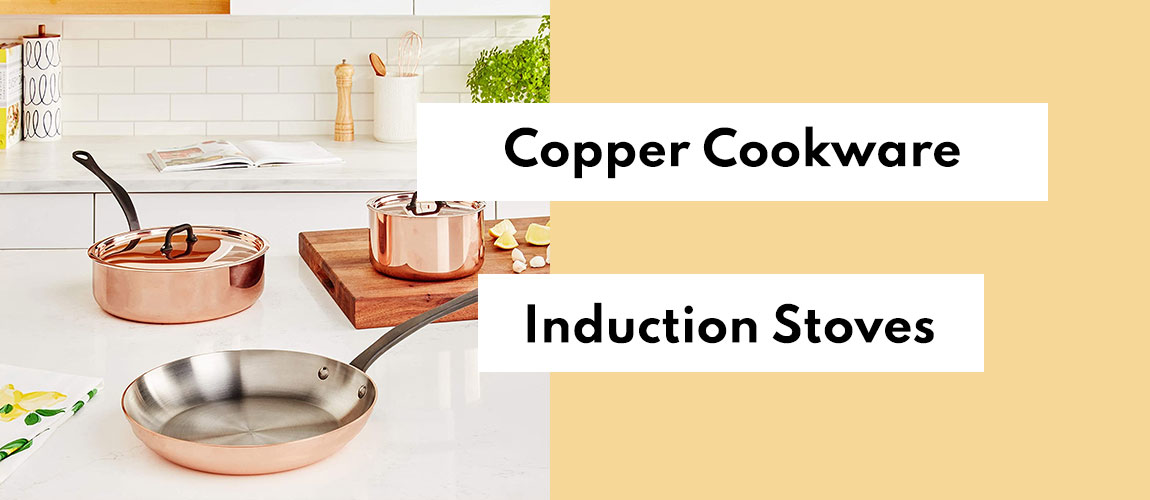
Traditional copper cookware can be used on classic stoves—gas, electric or ceramic heaters—but not on induction hobs. Induction cookers use electro-magnetic vibration of the atoms to create heat through molecular tension, so they work only with pots and pans that made of (or at least contains) iron or a magnetic gauge of steel. Unfortunately, copper, as well as aluminum and glass, doesn’t share this property so it can’t be used straight on induction stoves.
Is there a way to make it work on induction cookers? If you actually want to use copper pans on an induction stove, you’ll have these options:
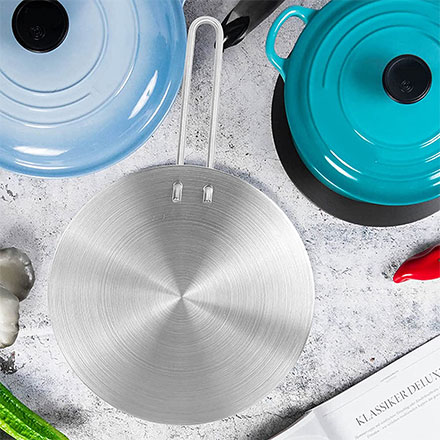
Heat Converter Plate
Using an induction diffuser plate as a converter to transfer heat by induction.
The Good:
The Bad:
Recommended for: Occasional use on induction burners or budget limitation.
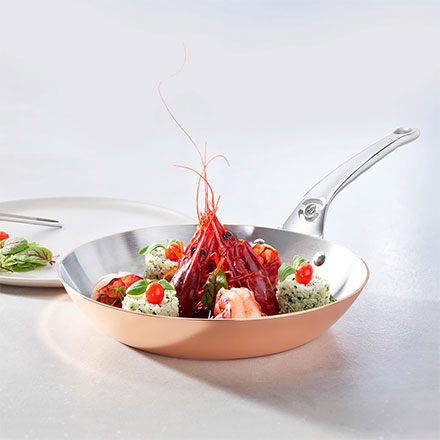
Induction-ready copper
Until now, if you need pure copper cookware that can cook on induction hobs, the one and only choice you’ll have is the de Buyer Prima Matera.
The Good:
The Bad:
Recommended for: Serious or professional cooking on induction burners.
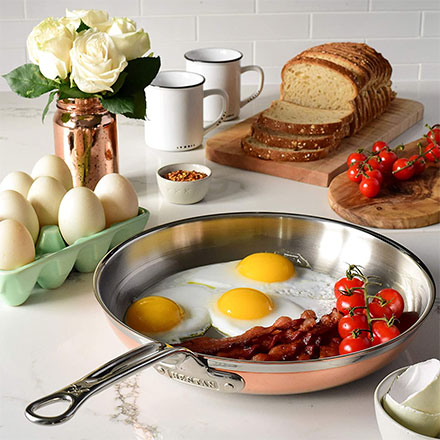
Copper Core
A reasonable compromise of performance, value and ease of use. Choose products that have a thickness of at least 1 mm of copper inside to ensure desirable outcomes.
The Good:
The Bad:
Recommended for: Daily culinary tasks, amateur cooks or use on various burners.
Suggested products: All-Clad Copper Core, Demeyere Atlantis, Hestan CopperBond
An induction converter plate — a.k.a. a converter disk, heat diffuser plate, induction adapter plate or induction interface disk — is a round paddle-shaped steel plate that sits under your incompatible cookware and works as a converter to transfer heat by induction. Say, it converts your induction hob to a metal electric disk burner, way similar to an electric coil burner.

The heat diffuser plate helps enhancing the induction-capability of copper cookware but significantly cuts down the heat performance.
Remember, not all of the converter disks available in the market produce good outcomes. A robust, dense and strong magnet metal disk with a heat-proof handle is preferable.
The Downsides
Albeit this method is a mainstream as is easy to find and economical, it’s rather burdensome and inefficient. Here’re big drawbacks:
In fact, it can be said: if you need real copper pans not copper core ones, one and only choice you’ll have is the de Buyer Prima Matera.
This French-made copper cookware is made with 90% pure copper and 10% AISI 304 stainless-steel — a 1.8 mm copper sandwiched by 0.2 mm stainless-steel. With a thin 1.0 - 1.5 mm (depending on the piece) layer ferro-magnetic steel disk encapsulated in the bottom, it’s fully induction-compatible without losing heat performance like using a converter plate.

The de Buyer Prima Matera is a rare copper cookware that can be fully compatible with induction burners.
The performance is excellent — heats super-fast and very evenly. With a stainless-steel lining and ergonomic cast stainless-steel handles, it’s nice for daily use while needs lower maintenance than traditional products that have tin lining with cast-iron handles. Not only induction-compatible, it’s also oven- and broiler-safe, as well as works with electric, ceramic or AGA burners.
However, the stellar features come with the cost. Comparing to others at the same level (2 mm thick), it costs you some extra dollars. For example, while the Mauviel M'200 (CI) 12” Frying Pan is at $435*, the Prima Matera 12.5” Fry Pan is about $700*.
Assuredly, if you’re fascinated with copper cooking and only cook on induction hobs, the Prima Matera is a worthy investment.
This is a reasonable choice that compromises the performance, value and ease of use. By lessened some levels of thermal efficiency, the copper core cookware — we mean the multi-ply stainless-steel that have thick copper layer inside — is a perfect workhorse for everyday home tasks.
Unfortunately, among tons of products boasted for ‘copper core’, ‘copper infuse’ or use copper to boost thermal ability, there’re few of them that really can be functional due to the too thin copper layer — you’ll need at least 1 mm thickness of copper for practical use.
Here’re workable products to consider:
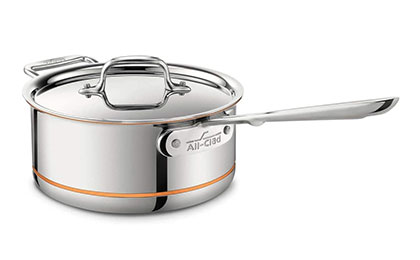
With almost 1 mm copper inside, the 5-ply All-Clad Copper Core is compliant for home chefs to enjoy copper cooking experience on induction burners.
Excluding the beauty of copper finish, All-Clad Copper Core, the respectable standard of this class, has nearly 1 mm thick of copper yields way better results than copper pots and pans that has less 1.5 mm of total thickness.
Aside from its induction-compatibility, the Copper Core needs much less maintenance than copper cookware. Just like other quality stainless-steel stuffs, it can be simply clean with detergents, put in the dishwasher sometimes when you’re too busy and it hassle-free to keep polish.
Additionally, it’s more value-accent — you can get a couple pieces of the Copper Core with the same budget of a copper pan.
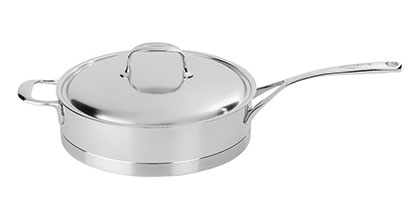
The Demeyere Atlantis (or Proline) has a 7-ply base of luxurious conductive layers—silver and 2mm copper—that can massively increase heat ability.
With a 7-ply conductive base that consists of a stainless-steel ply bonded the bottom disc with two layers of silver and a 2 mm thick copper layer, the Demeyere Atlantis (or Proline in some countries) makes exceptional thermal responsiveness and even cooking — far better than tons of fully clad cookware in the market.
In fact, it unexpectedly gives more evenly results and easier thermal control than the pure 2.0mm copper pans with stainless-steel lining, like Mauviel M'200.
While the Demeyere is induction compatible, it’s easy to care. The ‘Silvinox’ finish — a unique electro-chemical surface treatment system that changes the surface chemistry of natural stainless steel without adding any new chemical in the process — makes it shinier, harder and more corrosion-resistant than common 18/10 stainless-steel. It also has slightly less food sticks and easier to clean.

The Hestan CopperBond offers a beautiful look with good ergonomic designs for friendlier to use.
The Hestan CopperBond is a 5-ply that contain a pure copper core and two layers of aluminum (about 1 mm thick copper inside), so it gives impressive heat control and distribution — comes close to the All-Clad Copper Core. The skillet claims for having 20% more surface area than traditional fry pans for better browning, searing, and sauteing.
Unlike other clad cookware, the Hestan has stunning modern design with copper-stainless exterior (which can get tarnished like a copper pan). It also has ergonomic handles for comfortable to carry and maneuver and flush rivets for easy cleaning. A 12.5” open skillet is about $375.